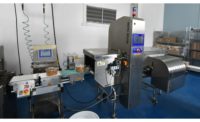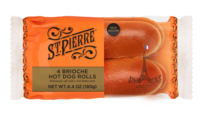Swift In Swiss Rolls
By Bernard Pacyniak
Fledging importer turns to manufacturing and segment innovation to propel Ramensky Pastry Plant into becoming the leading Russian manufacturer of specialty Swiss rolls and a force in baked sweets.
The drive to the Ramensky Pastry Plant manufacturing facility started out the way most drives within Moscow proper do — slowly. Anyone familiar with the city’s rush hour traffic can attest that it can compete with the best of any major metropolis in a congested car crawl contest.
The gray skies didn’t change color as the vehicle approached the city’s limits, though the pace certainly picked up. The speedometer finally moved past 30 kilometers and didn’t stop until it hit 100, a sure sign — besides the snow-covered plains and distant villages on the horizon — that one was in the countryside.
Within two hours of leaving the city, the car pulled into the Prodsnab industrial park, located just on the outskirts of the Kuznetcovo village. The visitors piled out of the mini-bus to take a first-hand look at this rapidly growing Russian confectionery concern, one that began as an importer of Swiss rolls in 1999.
After a brief check of credentials — a familiar formality in Russia — the group was warmly received into the company’s conference room. Sergey Kozyrkov, commercial director and chairman of the board, greeted visitors from Europe and the United States with product samples and coffee or tea.
Flanked by Mario Emilio Luis Campos, plant director, and Alla Bairamova, production director, he proceeded to talk about Ramensky’s rapid rise within the snack cakes category in Russia.
Six years ago, the Ramkonditer investor group had initially elected to import Swiss roll cakes from Poland under the Kovis brand, Kozyrkov explains. The aim was to introduce both the brand and the company as a local supplier within the Russian marketplace. Knowing well the country’s penchant for sweets and chocolate, it didn’t take long for the group to gain a foothold in the Swiss rolls pastry segment.
Given the positive results, the company purchased the Kovis brand to exclusively produce Swiss rolls in Russia and former CIS countries. In doing so, it searched out a site that would accommodate such production, eventually selecting the 6,000-sq.-meter building in Kuznetcovo, thereby becoming the first Russian-owned producer of Swiss rolls, he proudly proclaims.
The company purchased a used roll-making line from Spain in August and began putting together the foundation for a pastry production plant.
“On January 20, 2000, the first Swiss rolls came off the line,” Bairamova tells the visitors. “We had two shifts working from 9 a.m. to 9 p.m., five days a week.” Within nine months, production was expanded to three shifts.
The popularity of the locally produced Swiss rolls quickly led to the company establishing a “market position,” Kozyrkov says. In addition to having the Kovis brand, which was targeted toward a mid-market price range, the company established two new brands: Fairy Tale (Skazochny roullet), aimed at mass-market consumers, and Master of Dessert, a more upscale brand attracting the high-end middle market, as well as gourmet consumers.
Armed with a much broader brand reach, the company focused on expanding distribution to include all major Russian cities. Before long, Ramensky found itself competing head-to-head with the well-known Danish Swiss roll producer, Dan Cake.
“Statistics for 2004 [the latest available at press time] show that Dan Cake had 26% of the category while we had 20%,” Kozyrkov explains. “We believe that the company will reach 22% of share in 2005. Our goal for 2006 is to achieve 24%.”
Such confidence isn’t unwarranted. Looking at the company’s rapid growth, one begins to understand the strategic thrust; it’s based on knowing the local market extremely well and having the pluck and perseverance to move quickly to establish excitement and innovation within the category.
Take, for example, the company’s decision to install a second line. It didn’t merely do so to add capacity; it added versatility.
“We were the first confectionery company in Russia to produce mini-Swiss rolls [roulettes],” Kozyrkov says. “As a matter of fact, it was a monopolistic sub-category for us for more than three years.”
That first-to-market approach reaffirmed the company’s aggressive growth strategy. As it stands, mini-Swiss rolls (five to a 175-gram package) now account for 36% of the volume, with Swiss rolls (one roll in either 200 or 250-gram packages) and mini cakes (six to a 200-gram package) making up 54% and 10%, respectively, of the plant’s output.
Product innovation remains a key tactic for the company, which still is in its infancy compared to other established confectionery and biscuit players in Russian. With sales topping 500 million rubles (about $17 million) in 2005, according to estimates by Russian research companies, it’s clear the company doesn’t have the same resources that multinationals or long-time midsized operators have.
“Our intentions are to introduce a new product every three months,” Kozyrkov says. “It’s a way of making us a stronger competitor in the marketplace.”
As a means of ensuring that happens, a new products group, consisting of marketing and sales members, convene regularly to discuss and sample new items produced by Ramensky Pastry.
Products may go through five or 10 revisions before being accepted by the group. Consequently, rollouts can vary between one, five or even 10 months, he explains.
To date, the company has enjoyed particular success with its key rollouts, beginning with the mini-Swiss rolls and extending into mini-cakes. The mini-cakes, which come in yellow and chocolate dough varieties with assorted fillings (hazelnut, strawberry cream, milk cream, strawberry, cherry, peach and caramel), have become the company’s most popular item, necessitating installation of a new Lagos mini-cake line.
The commitment to growth, buttressed by a willingness to invest in automation and evolving technology, is tempered only by the realities of planning and execution. Currently, the plant operates 24/7 with four shifts on call, producing 1,500 tons monthly. When taking into account demand, sanitation, changeovers and down time (maintenance, repair), the facility operates between 82% - 85% capacity.
Five lines are dedicated to Swiss roll, mini-Swiss rolls and mini-cakes, with lines 1 and 5 having the capability to produce Swiss rolls and mini-Swiss rolls, lines 2 and 3 making mini-rolls (during winter the lines can be adjusted to produce large Swiss rolls to meet demand), and line 4 dedicated to mini-cakes.
Last June, the company installed a new line (6) for the production of wafer pies (one to a 300-gram package), a new product that recently debuted. And this month, the company just completed putting in a new pie line (7), the latest innovation from the company.
The sweet pastry dough, which is filled with jam and features a lattice top, still is undergoing some final tweaking before it’s rolled out sometime this quarter.
Given the fact that lines 6 and 7 are dedicated to specific products, the management team admits the company is facing capacity issues, particularly as sales grew by 20% last year.
“Demand is outpacing production,” Kozyrkov acknowledges. Not only are those constrictions hampering domestic expansion, the company must remain selective with its exports business.
Exports currently comprise 15% of the company’s total business, with distribution available to all former CIS countries, as well as Lithuania, Mongolia and Serbia. Negotiations are currently underway with exporters based in Greece and Canada, Kozyrkov adds.
Conscious of the need to increase output, the company recently acquired a former cracker production facility in Samara, Russia, which is located about 700 miles southeast of Moscow, he says.
“We will install a universal line capable of producing Swiss rolls and min-Swiss rolls, as well as a line to manufacture special pies,” he says. “Our aim is to install automated equipment and minimize manual labor.”
The one-million euro investment would boost production by 25%, enabling the company to meet the ongoing domestic demand for both its existing and new products. It also would allow Ramensky Pastry to seize more export opportunities.
The timetable for startup remains a work-in-project, with the second quarter of 2006 an optimistic date. In the interim, the focus remains on keeping all lines running in Kuznetcovo. SF&WB
At a Glance
Ramensky Pastry Plant
Headquarters: Moscow
Plant: Kuznetcovo Village, Russia
Size: 6,000 sq. meters
Warehousing: 9,000 sq. meters (two separate buildings, 4,000 & 5,000 sq. meters)
Employees: 800
Sales: 500 million rubles ($17 million) — Russian research estimates
Products: Swiss rolls and mini-Swiss rolls, mini-cakes (muffins), wafer pies, and pastry pies
Brands: Master of Dessert, Kovis and Fairy Tale




